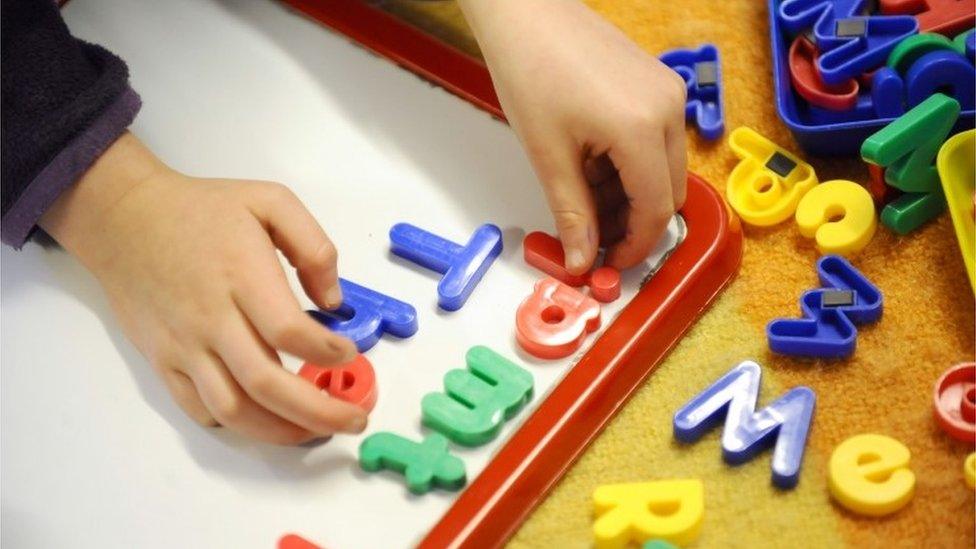Adoption and coronavirus: How has adoption changed in the pandemic?
- Published
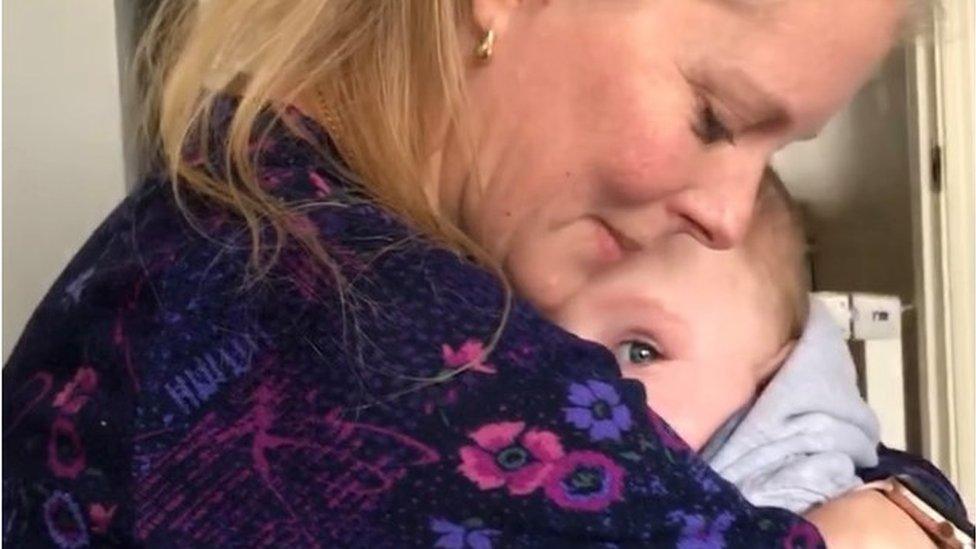
Amber has opted for an open adoption after building a positive relationship with the birth mother
The coronavirus pandemic has touched every aspect of our lives, including how prospective parents are able to adopt. We have spoken to three families about their experience of trying to adopt during lockdown.
The adoption process means allowing people to delve deeply into your life history to see how that will shape you as a parent and requires detailed answers about your finances and support networks to see whether you have the resilience to parent a child who started life in the most difficult of circumstances.
Three families who chose to pursue their plans via Adopt South West partnership of councils during the pandemic say it has resulted in some surprises, from building an unexpected relationship with a birth parent to facing months of delays or having their application fast-tracked.
'Juddering halt'
"We did it for altruistic reasons in the first instance but it's turned into a beautiful love story," said Amber, a health professional and mother of three.
Normally adoptive parents and foster carers go through introductions where adoptive families spend time at the foster carer's home typically over a period of a week to get to know their child before taking them home, often staying in accommodation nearby.
But due to coronavirus restrictions, the foster carers stayed over with Amber's family for a long weekend instead.
The family had already waited since 23 March - when social workers confirmed their daughter would be coming home to them.
With the announcement of lockdown, the family was left to wait another two months before they could meet her and no-one knew how to follow coronavirus guidance when it came to introductions.
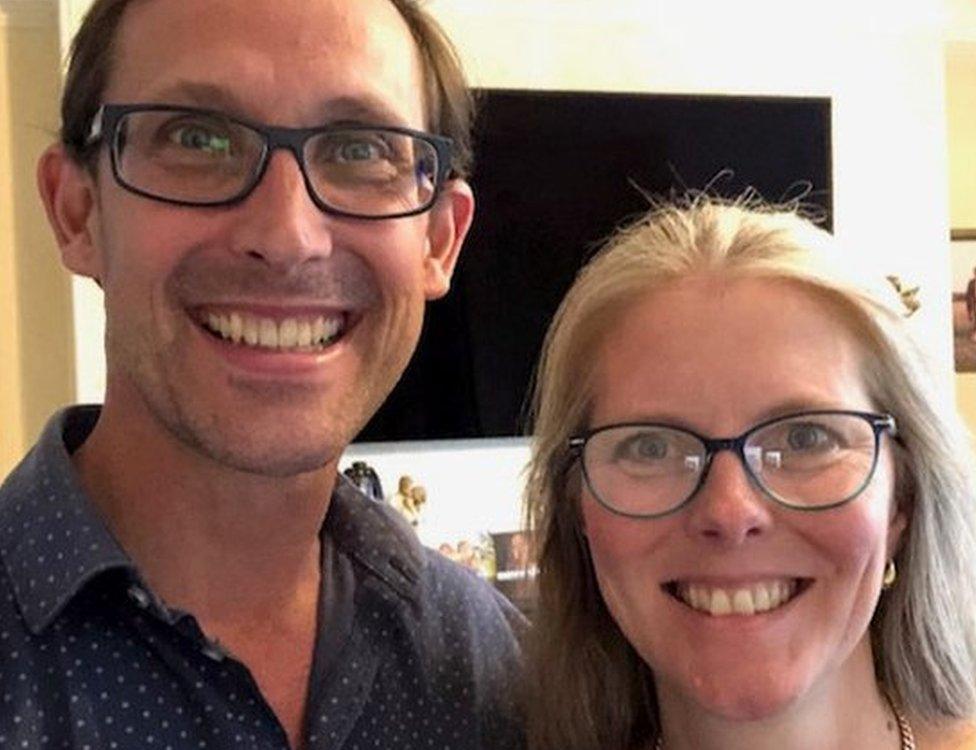
Lockdown meant Amber and Earl and their children had to wait two months before they could meet their new daughter
"We were gutted to be missing bits of her life," Amber said.
"We had to be philosophical and we were quite busy with home-schooling our three big kids and settling our toddler."
To take part in the introductions Amber's family chose to fully self-isolate in the hope their baby girl could be placed sooner with them.
They were pursuing a fostering for adoption placement for which contact meetings with the birth parents is a legal requirement.
Direct contact
Pandemic restrictions however meant the contact centres where they would normally meet up were closed.
Instead Amber and the birth mother made contact via video call and in August they met face to face in a pre-booked room at a hotel.
"I did the contact myself - there wasn't any worker or supervisor, social worker there," said Amber.
"It was me, and the birth mum and the baby, which again is really rare."
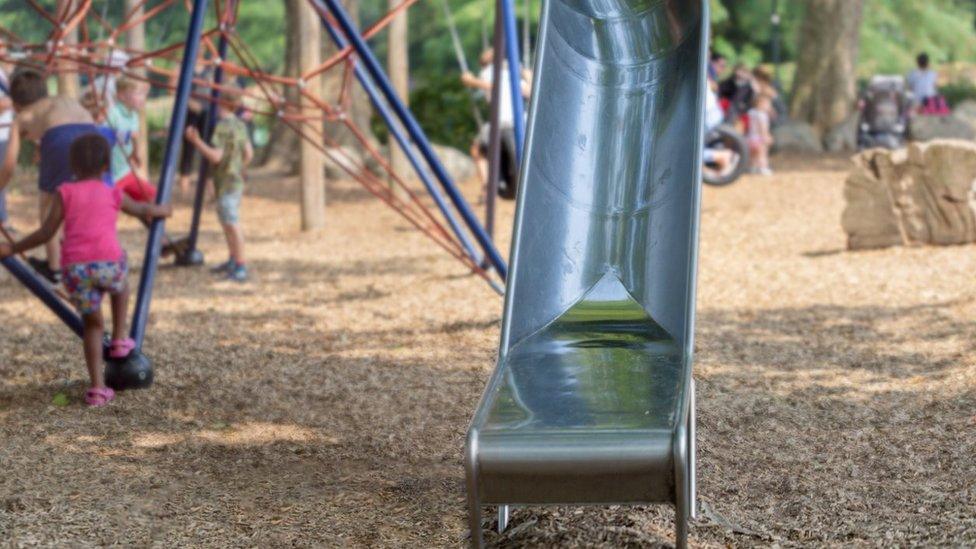
Amber and her family have opted for an 'open' adoption where children continue to see the birth mum
She said the arrangement was agreed partly due to her profession and partly because the birth mother was not considered a dangerous parent.
She added that lockdown meant they could get to know each other, something that would not have happened without lockdown, which has since resulted in both parties agreeing to an open adoption where the birth mum has regular face to face contact with the adoptive family.
"It would have been a case of dropping the baby off at the contact centre or somebody taking the baby off to a contact centre.
"I wouldn't have encountered the birth mum in the same way - that's going to benefit both parents and the children into the future," added Amber.
'Blessing in disguise'
Foster carers Danny and Rita's daughter was placed with them in November 2019.
Rita described lockdown as a "blessing in disguise" because the family was able to bond with the toddler more quickly by being at home together.
"Obviously lockdown has had an effect," she said.
"It's been hard for her not having that social interaction with other children and you can see that."
"She's in a house full of grown ups.
"Our boys [aged 16 and 20] are great with her, they adore her, but not seeing other little people has affected her."
The couple added they were still facing delays in obtaining her adoption certificate, which is the equivalent of a birth certificate.
Despite the delay, they have already begun the process to adopt a second time.
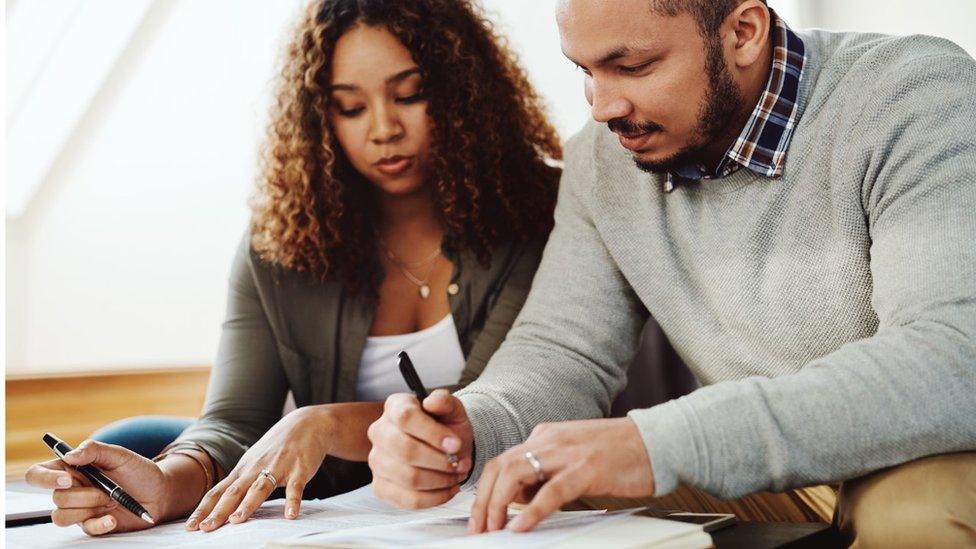
The adoption approval process consists of two stages and normally takes six months to complete
James and Harry, whose names have been changed, also began the adoption process during lockdown.
"When you see people dropping dead left, right and centre it makes you think more about life.
"Tomorrow's never a promise, you have to seize these opportunities," said Harry, a health professional.
They began the adoption process when the first national lockdown started in March 2020.
"Obviously with adoption there's a lot of paperwork, there's a lot of things you've got to go through with social workers, pretty much digging up your entire life history and dealing with that as well.
"So having the opportunity to just be at home without the rest of life going on in the background helped with the process for me," said James.
Harry added: "I would agree with that. We were both still working. The world just stopped so that gives you time to reflect.
"It did harden our resolve because we had a very good social worker who was on top of it."
They went down the route of fostering for adoption where the child is fostered by the prospective adopters while the courts decide on the child's long-term future.
All prospective adopters go through a two stage process which usually takes about six months to complete before they go to an approval panel and can start the family finding stage.
Once a family is "matched" with their child, it can still take several weeks before a matching panel is held and introductions can begin.
Harry said: "Initially during Stage One, just trying to get a medical was really difficult during lockdown.
"I wrote to MPs, the education secretary, to say this is a service no-one is offering but people still need and that took so long."
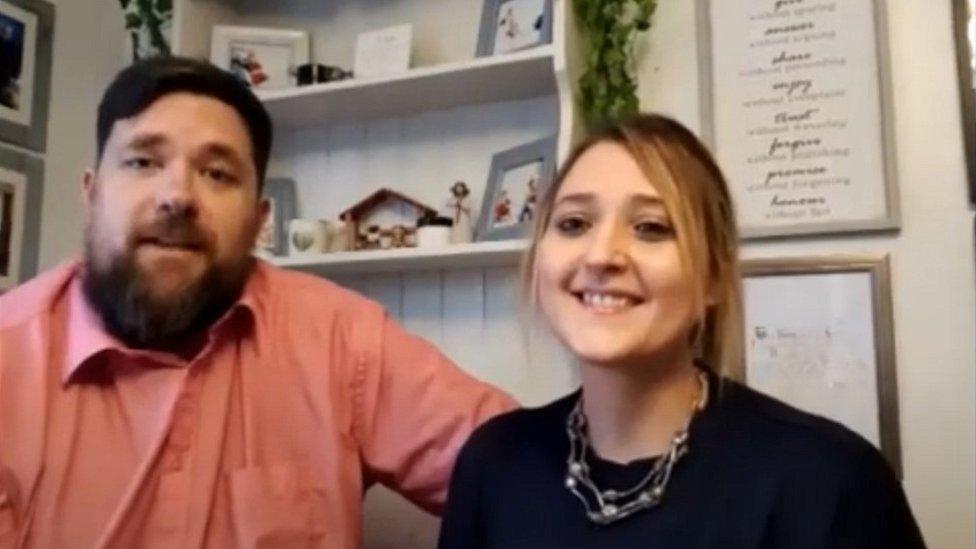
Danny and Rita saw lockdown as a "blessing in disguise"
It was eventually resolved so they could complete their paperwork.
However for the couple, as it was a fostering for adoption placement, their approval and matching panel was held within hours, applying new coronavirus legislation which came into force in April.
"We were the first people in the south west to use the Covid regulation to hold the extraordinary adoption panel and they informed us of the outcome," said James.
"It turns your life upside down."
As a result, they were able to bring their daughter home within a fortnight.
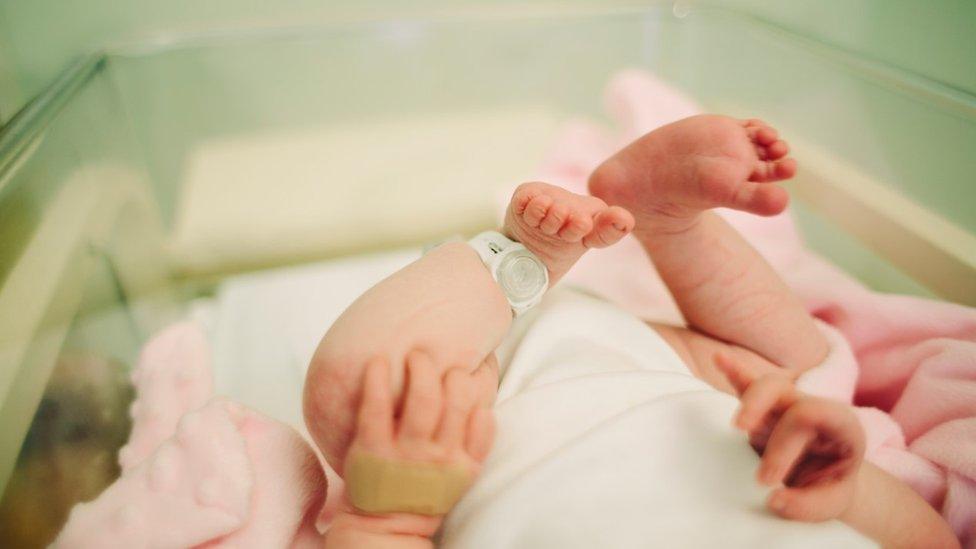
James and Harry were placed with a baby girl, "turning their life upside down"
James described meeting their newborn daughter as a mix of "excitement, fear, terror".
"It was an out of body experience."
"It had all happened so fast, but the first time I held her it was like magic, this is right, it was how it was meant to be."
Harry added: "I had that sort of instant attachment and that warmth and amazement."
As with Danny and Rita, and other new parents, they have thrived on the extra bonding time created by lockdown.
She is the "best thing that's come out of the year," added Harry.

Follow BBC West on Facebook, external, Twitter, external and Instagram, external. Send your story ideas to: bristol@bbc.co.uk , external
Related topics
- Published20 September 2020
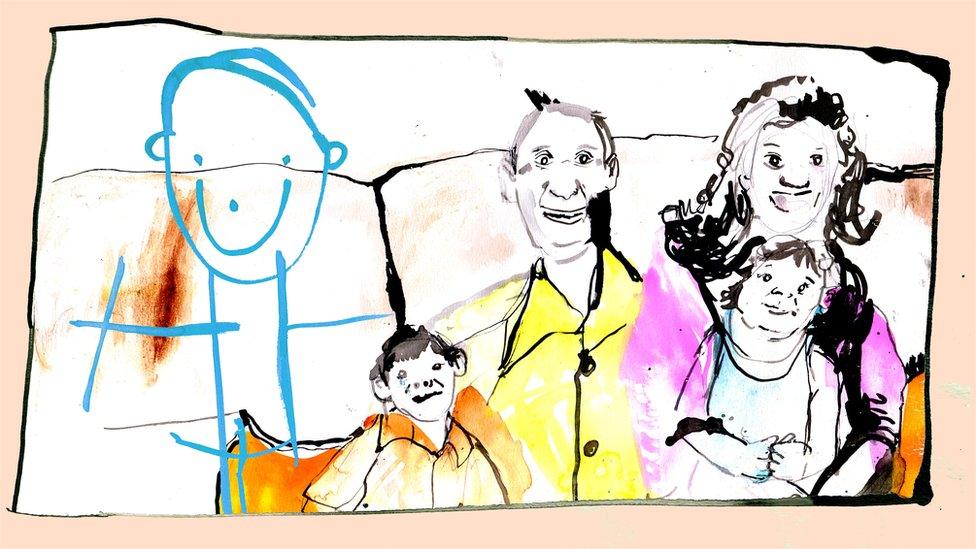
- Published2 December 2020
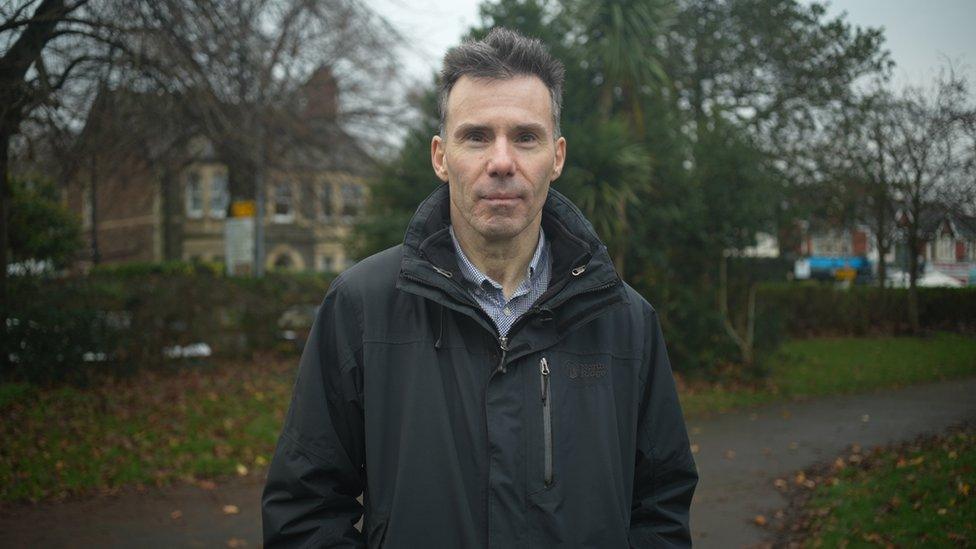
- Published28 April 2020
